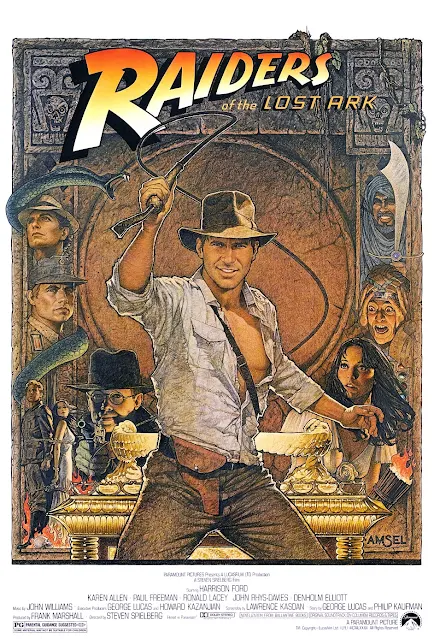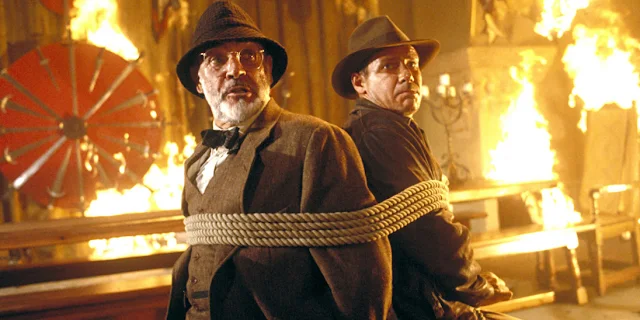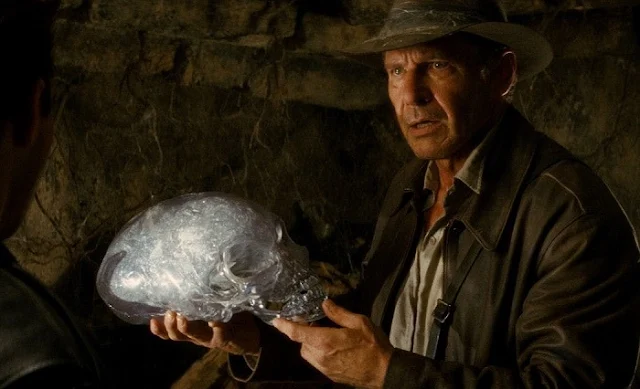One of the central themes woven throughout the Indiana Jones series is the eternal battle between good and evil. Indy encounters villains who seek to exploit ancient artifacts for personal gain or to further their nefarious agendas.
A profound theme in Indiana Jones films is the exploration of the unknown.
A recurring motif in the series is the pursuit of knowledge and power. Indiana Jones encounters artifacts that possess extraordinary abilities or are believed to grant immortality. The lessons he learns emphasize the importance of humility, human connection, and embracing mortality. Indy realizes that the true value of life lies not in seeking immortality but in cherishing the limited time we have and nurturing the relationships that give our lives meaning.
Family and personal connections are thus themes that come to the forefront in "Indiana Jones and the Last Crusade." Through his tumultuous relationship with his father, Indiana Jones learns the importance of forgiveness, reconciliation, and the unconditional love that binds families together.
His quests take us on a journey of self-discovery, teaching us profound lessons about morality, humility, the preservation of history, the acceptance of the unknown, and the power of human connections. Indiana Jones stands as a timeless icon, reminding us to embrace life's adventures, confront our fears, and seek wisdom in the most unexpected places.
Raiders of the Lost Ark - themes and lessons learned
In "Raiders of the Lost Ark," the climactic ending showcases Indiana Jones' discovery of the lost Ark of the Covenant. As an archaeologist and adventurer, Indy is driven by his quest for historical artifacts, seeking to preserve them and prevent them from being misused. However, the vital life lesson he learns in this film is that knowledge and power, when wielded irresponsibly, can have devastating consequences.
Throughout the film, Indiana Jones faces various obstacles and adversaries, including the Nazis led by René Belloq and Colonel Dietrich. Both parties are after the Ark, believing that its power will grant them an insurmountable advantage. However, when the Nazis finally open the Ark in their quest for supremacy, they unknowingly unleash a malevolent force that they are ill-equipped to handle.
The climax takes place in a remote island location, where the Nazis perform a ceremonial opening of the Ark. As they remove the lid, a supernatural force is unleashed, resulting in a terrifying spectacle that ends in the deaths of Belloq, Dietrich, and their soldiers. The wrathful power of the Ark disintegrates those who dared to look upon it, emphasizing the ancient artifact's immense power and the danger of mishandling it.
Through this dramatic ending, Indiana Jones learns the importance of respecting ancient artifacts and their potential consequences. It highlights the idea that some knowledge is not meant to be pursued or controlled by humanity. The Ark serves as a metaphorical representation of the danger of unchecked ambition and the consequences of seeking power without considering the potential harm it can cause.
Indy's character arc throughout the film aligns with this life lesson. Initially, he views the Ark as merely another archaeological find, driven by his desire to keep it out of the wrong hands. However, as events unfold and he witnesses the Ark's true power, he recognizes the need for it to remain hidden and protected.
The ending of "Raiders of the Lost Ark" reinforces the theme of humility in the face of ancient knowledge and power. It reminds both Indiana Jones and the audience that some things are better left untouched, that the preservation of history is more important than personal gain or the pursuit of power. The film serves as a cautionary tale, urging individuals to approach artifacts and historical discoveries with respect and reverence, recognizing the potential consequences of mishandling them.
Temple of Doom - he who finds a friend finds a treasure
In "Indiana Jones and the Temple of Doom," the film's ending showcases Indiana Jones' heroic efforts to rescue enslaved children and put an end to the Thuggee cult's nefarious plans. While the Indiana Jones series is known for its thrilling adventures and pursuit of historical artifacts, this film places a strong emphasis on the theme of compassion and empathy.
Throughout the movie, Indy finds himself entangled in a web of darkness as he confronts the Thuggee cult, led by Mola Ram. The cult is engaged in kidnapping children and using their labor to mine for sacred stones, which they plan to use for sinister purposes. As Indiana Jones discovers the extent of the cult's atrocities, he recognizes the urgency to free the children and halt their nefarious activities.
The climax of the film takes place within the Temple of Doom, where Indiana Jones confronts Mola Ram and his followers. In a thrilling sequence, Indy fights against overwhelming odds, eventually managing to rescue the children and put an end to the cult's reign of terror. The triumph lies not only in the recovery of the children but also in his ability to prevent the misuse of the sacred stones.
The ending of "Indiana Jones and the Temple of Doom" serves as a poignant reminder of the significance of compassion and empathy in the face of oppression. Indiana Jones realizes that his actions, driven by a genuine concern for the lives of others, hold far greater value than the artifacts he seeks. By prioritizing the well-being of the enslaved children over his personal pursuits, he exemplifies the importance of standing up against injustice and using one's abilities to help those in need.
The life lesson here is that true heroism lies in the selfless act of aiding others, especially when they are vulnerable and oppressed. Indiana Jones's transformation throughout the film reflects this realization. At the beginning, he is motivated by personal gain, seeking to recover stolen artifacts. However, as he witnesses the suffering of the children and becomes aware of the cult's plans, his motivations shift towards protecting and saving lives.
By the end of the film, Indiana Jones understands that his actions have the power to make a meaningful difference in the lives of others. The true value of his endeavors becomes evident in the happiness and freedom he restores to the rescued children. The emphasis on compassion and empathy serves as a powerful reminder that our actions should be guided by empathy and a commitment to helping others, rather than being solely focused on personal gain or material wealth.
In summary, the ending of "Indiana Jones and the Temple of Doom" highlights the essential qualities of compassion and empathy. Indiana Jones's realization that the lives he saves hold greater significance than the artifacts he recovers reinforces the importance of standing up against oppression and using one's abilities for the betterment of others.


















